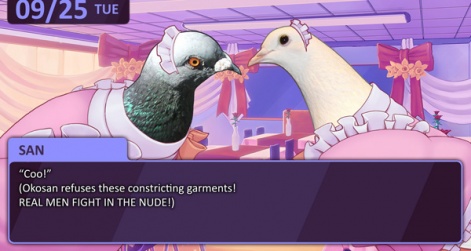Making sure you start the year in style, Pocket Gamer Connects London is happening on 13-14 January 2015 at Vinopolis.
And tickets are available now.
So to give you a hint at what you can expect, we're shining the spotlight onto our speakers to provide a deeper look at the personalities who will be taking the stage at PG Connects London 2015.
Finding your perfect niche
Paul Croft has been designing, developing and producing digital games for the past 12 years.
Since co-founding Mediatonic nine years ago he has helped grow the firm to a team of 60+ based across two studios.
Recent Mediatonic games include Amateur Surgeon, Foul Play, Robot Unicorn Attack Evolution and Hatoful Boyfriend.
Pocket Gamer: We're showcasing the Best of British at Pocket Gamer Connects so how much of an impact have British game developers had in your gaming life?
Paul Croft: UK game developers have had a huge impact on my gaming life. I was a big fan of Bullfrog and Rare, in particular with GoldenEye and Dungeon Keeper being among my favourite games of all time.
As a nation I think we're great at developing innovative games with great heart and soul.
Why is user acquisition such a challenge in the mobile business today and what can games companies do to give themselves a fighting chance?
It's primarily due to the rising acquisition cost relatively to typical ARPUs one might expect from a free-to-play title. Companies that are at the top of the charts can afford to spend big money to retain their position, which means it's increasingly challenging to break in.
Games companies can do things like:
- Partner with publishers who can achieve better economies of scale through large ad buys and cross promotion,
- License existing IP with a fan-base to reduce UA cost,
- Build a game that caters to a very niche market to maximise return,
- Plan collaboration events with other game developers to share traffic.
Ultimately there are a number of different solutions depending on your size and position in the market, but it's important to think about your approach early in the development of your title.
What are the major challenges currently facing games businesses when publishing abroad?
It depends a great deal on the countries targeted.
For example, in Asia, each market has its own nuances, platforms and differences. China is vastly different from Japan. Relationships in Asia take a long time to build and require a lot of face-to-face contact time in order to cement and form long term partnerships.

In addition, without visiting these markets, it can be difficult to understand their unique requirements for titles.
For games businesses I would say the key challenges are: understanding the nature of markets they wish to break into; and the potential effort involved in culturalisation if the game has not been built with this in mind.
Getting out and spending some time in the market is by far the best first step in order to start exploring opportunities overseas.
How can indie developers adapt to survive in the mobile economy?
Frankly on mobile it will become increasingly difficult for indies to survive, particularly if they are self-publishing on the platform.
In my view the best route to success for a self-publishing indie developer is to focus on a niche market that they know inside out.Paul Croft
In my view the best route to success for a self-publishing indie developer is to focus on a niche market that they know inside out and make something that a subset of people will really love - ideally, keeping costs as low as possible.
Alternatively, partnering closely with a publisher who understands your game and can invest the capital that is required on the UA side is an alternative, particularly if your title is more mass market.
Will new technology like wearable tech and VR change the mobile landscape?
I don't believe these devices will significantly change the mobile landscape within the next few years as far as gaming is concerned. I believe these devices, particularly VR, will remain relatively niche.
There's opportunities there for smaller indies to tap into that market, but I don't believe it will become mainstream in the near future.
What are you most looking forward to at Pocket Gamer Connects?
Catching up with industry friends and getting insight into what trends and challenges they see happening in mobile games over the coming year.
What's your prediction for the mobile gaming industry in 2015?
I think in 2015 we'll see a continued rise in production values and quality across mobile games in general.
The potential revenue and rewards will continue to rise however, the segment will continue to become more competitive and challenging for new players to enter the market.

Grab your tickets for Pocket Gamer Connects London 2015 here!
Don't forget to keep up-to-date with content from our speakers via the Speaker Spotlight hashtag.
And you can check out videos from PG Connects Helsinki 2014 here.






















